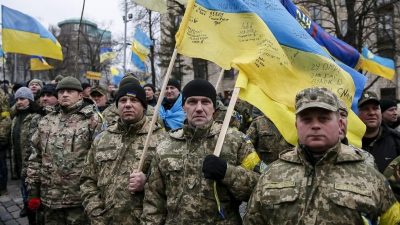Why Does Ukraine Want War?

All Global Research articles can be read in 51 languages by activating the “Translate Website” drop down menu on the top banner of our home page (Desktop version).
***
Ukraine wants war with Russia due to a combination of domestic and international factors, but such a scenario would be disastrous for the Eastern European country and only serve the interests of some members of the political elite and their foreign patrons.
The whole world is watching with bated breath to see whether Ukraine and Russia will go to war over Donbass like many fear might be about to happen due to recent events. I asked earlier this week whether “Vaccines Are The Real Driving Force Behind The Latest Donbass Destabilization”, pointing out the grand strategic interest that the US has in provoking a crisis that would put unprecedented political pressure on the EU to not buy Russia’s Sputnik V like the bloc’s top members are reportedly considering at the moment, but there’s more to it than just that at the comparatively lower strategic levels.
Ukraine wants war with Russia due to a combination of domestic and international factors, including its ruling elite’s desire to distract from a slew of domestic crises. These include its efforts to stamp out the increasingly popular opposition through a series of witch hunts, attract emergency Western financial aid to facilitate their struggling economy’s recovery, and perhaps become important enough to the West that they can finally receive much-needed vaccines for their population that they’ve hitherto been denied for inexplicable reasons. Moreover, the powerful influence of ultra-nationalist (fascist) militias can’t be discounted either.
On the foreign front, the US certainly never tries of causing trouble for Russia however and wherever it can. In the present context, any “continuation war” in Donbass could in theory impose unexpected financial costs on the country, among other potential consequences like serving as a pretext for more sanctions against it. Broadly speaking, the US might also hope that it can manipulate the optics of the conflict that it’s arguably trying to provoke in order to pressure Germany to pull out of its agreement to finish the Nord Stream II pipeline, however far-fetched that outcome might be in reality.
The Ukrainian political elite and their foreign patrons would be the only possible beneficiaries of such a conflict should one be successfully sparked by the US but even they, however, might experience blowback in the event that the Ukrainian Armed Forces and their allied ultra-nationalist (fascist) militias are decisively beaten on the battlefield. Facing that probable scenario, Kiev might urgently request NATO support, though it’s unclear whether any would be forthcoming, and if so, to what extent and whether they’d have a mandate to directly fight Russian-friendly rebels and perhaps even Russia itself should it intervene to protect its border and citizens.
What’s thus far certain at this point is that Ukraine wants war. This is evidenced not only by the previous arguments above, but also by its chief negotiator on Donbass demanding that the venue of the Minsk talks be switched from Belarus to somewhere else like Poland despite the latter indisputably being a partisan player in this larger conflict. This signifies that Kiev isn’t interested in continuing to pursue a peaceful resolution to its off-and-on civil war, which was actually obvious to all objective observers for quite a while already since it was none other than the Ukrainian government itself which refused to fully implement the Minsk Accords.
The Russian-friendly rebels and the neighboring eponymous state that politically (and according to some questionable reports, militarily) supports them have long been calling on Kiev to grant Donbass the special status that the Ukrainian government previously agreed to as a result of the Minsk Accords. The US has consistently pushed its Ukrainian client not to implement the promised political reforms in order to retain the country’s status as a Hybrid War ulcer on Russia’s border that could continue progressively eating away at its legitimate security interests and eventually be externally exacerbated at a strategic moment like the present.
The current timing of Ukraine’s latest US-backed anti-Donbass provocations is linked to the reportedly impending success of Russia’s “vaccine diplomacy” with the EU, Nord Stream II’s near completion, Ukraine’s series of domestic crises, but also Biden’s rise to power. The President and his family reportedly have a history of corrupt dealings with Ukraine, which gives them vested interests to militarily support it beyond whatever any other US leader might have promised in such a situation. This in turn ratchets up the danger to Russia since Biden might do the unthinkable by deploying US combat troops to Eastern Ukraine in the worst-case scenario.
As can be seen, Ukraine wants war for its own self-interested reasons, but it wouldn’t have any realistic chance of provoking such had it not been for the US’ – and specifically, the Biden family’s – support for this. No one else, least of all Russia, wants another conflict to explode in Eastern Ukraine, but Moscow will defend its legitimate security interests related to its international border and the security of its citizens in Donbass should the situation go south really soon. Kiev is thus at risk of opening up a can of worms as a result of its feverish march towards war, and while the US and Russia might not clash, Ukraine might still collapse in the end.
*
Note to readers: please click the share buttons above or below. Forward this article to your email lists. Crosspost on your blog site, internet forums. etc.
This article was originally published on OneWorld.
Andrew Korybko is an American Moscow-based political analyst specializing in the relationship between the US strategy in Afro-Eurasia, China’s One Belt One Road global vision of New Silk Road connectivity, and Hybrid Warfare. He is a frequent contributor to Global Research.

